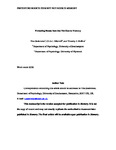Pretesting boosts item but not source memory
| dc.contributor.author | Seabrooke, T | |
| dc.contributor.author | Mitchell, Chris | |
| dc.contributor.author | Hollins, Timothy | |
| dc.date.accessioned | 2021-09-24T10:36:07Z | |
| dc.date.available | 2021-09-24T10:36:07Z | |
| dc.date.issued | 2021-09-17 | |
| dc.identifier.issn | 0965-8211 | |
| dc.identifier.issn | 1464-0686 | |
| dc.identifier.uri | http://hdl.handle.net/10026.1/17940 | |
| dc.description.abstract |
Two experiments examined the effect of pretesting on target recognition and source memory. In an initial encoding phase, participants attempted to learn the common English definitions of rare English words. For each rare word, the participants either guessed the definition of the rare English word before it was revealed (Pretest condition) or just studied the complete word pair without first guessing the definition (Read-only condition). To manipulate source information, the targets were either presented in different colours (Experiment 1) or lists (Experiment 2). In both experiments, the participants correctly recognised more targets from Pretest trials than Read-only trials, but showed no difference in source memory. Pretesting, therefore, appears to improve target recognition memory, but not memory for contextual information. The results are discussed in relation to semantic and episodic theories of the pretesting effect. | |
| dc.format.extent | 1-9 | |
| dc.format.medium | Print-Electronic | |
| dc.language | en | |
| dc.language.iso | en | |
| dc.publisher | Taylor & Francis (Routledge) | |
| dc.subject | Tests | |
| dc.subject | errors | |
| dc.subject | generation | |
| dc.subject | item recognition | |
| dc.subject | source memory | |
| dc.title | Pretesting boosts item but not source memory | |
| dc.type | journal-article | |
| dc.type | Journal Article | |
| dc.type | Research Support, Non-U.S. Gov't | |
| plymouth.author-url | https://www.webofscience.com/api/gateway?GWVersion=2&SrcApp=PARTNER_APP&SrcAuth=LinksAMR&KeyUT=WOS:000696855100001&DestLinkType=FullRecord&DestApp=ALL_WOS&UsrCustomerID=11bb513d99f797142bcfeffcc58ea008 | |
| plymouth.issue | 9 | |
| plymouth.volume | 29 | |
| plymouth.publication-status | Published | |
| plymouth.journal | Memory | |
| dc.identifier.doi | 10.1080/09658211.2021.1977328 | |
| plymouth.organisational-group | /Plymouth | |
| plymouth.organisational-group | /Plymouth/Faculty of Health | |
| plymouth.organisational-group | /Plymouth/Faculty of Health/School of Psychology | |
| plymouth.organisational-group | /Plymouth/REF 2021 Researchers by UoA | |
| plymouth.organisational-group | /Plymouth/REF 2021 Researchers by UoA/UoA04 Psychology, Psychiatry and Neuroscience | |
| plymouth.organisational-group | /Plymouth/REF 2021 Researchers by UoA/UoA04 Psychology, Psychiatry and Neuroscience/UoA04 REF peer reviewers | |
| plymouth.organisational-group | /Plymouth/Research Groups | |
| plymouth.organisational-group | /Plymouth/Research Groups/Centre for Brain, Cognition and Behaviour (CBCB) | |
| plymouth.organisational-group | /Plymouth/Research Groups/Centre for Brain, Cognition and Behaviour (CBCB)/Cognition | |
| plymouth.organisational-group | /Plymouth/Users by role | |
| plymouth.organisational-group | /Plymouth/Users by role/Academics | |
| plymouth.organisational-group | /Plymouth/Users by role/Researchers in ResearchFish submission | |
| dc.publisher.place | England | |
| dcterms.dateAccepted | 2021-09-01 | |
| dc.rights.embargodate | 2021-9-28 | |
| dc.identifier.eissn | 1464-0686 | |
| dc.rights.embargoperiod | Not known | |
| rioxxterms.versionofrecord | 10.1080/09658211.2021.1977328 | |
| rioxxterms.licenseref.uri | http://www.rioxx.net/licenses/all-rights-reserved | |
| rioxxterms.licenseref.startdate | 2021-09-17 | |
| rioxxterms.type | Journal Article/Review | |
| plymouth.funder | Learning from total failure: why do impossible tests boost learning?::ESRC |


